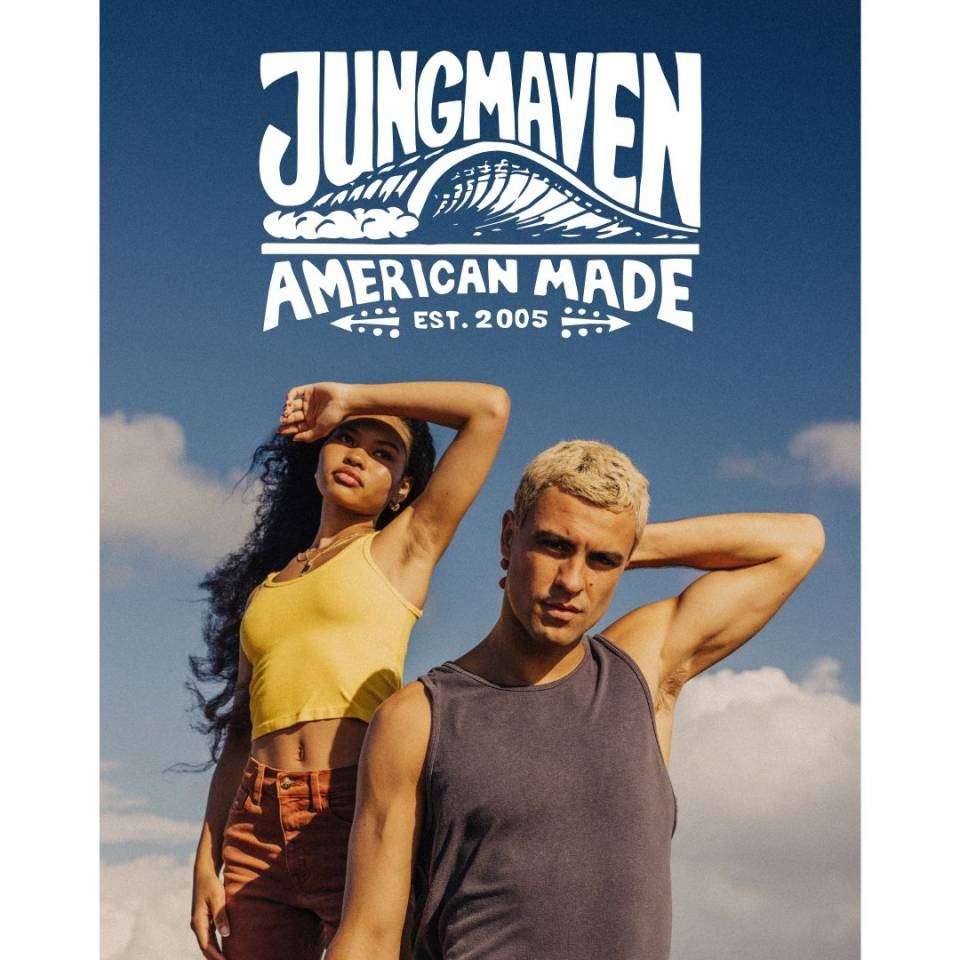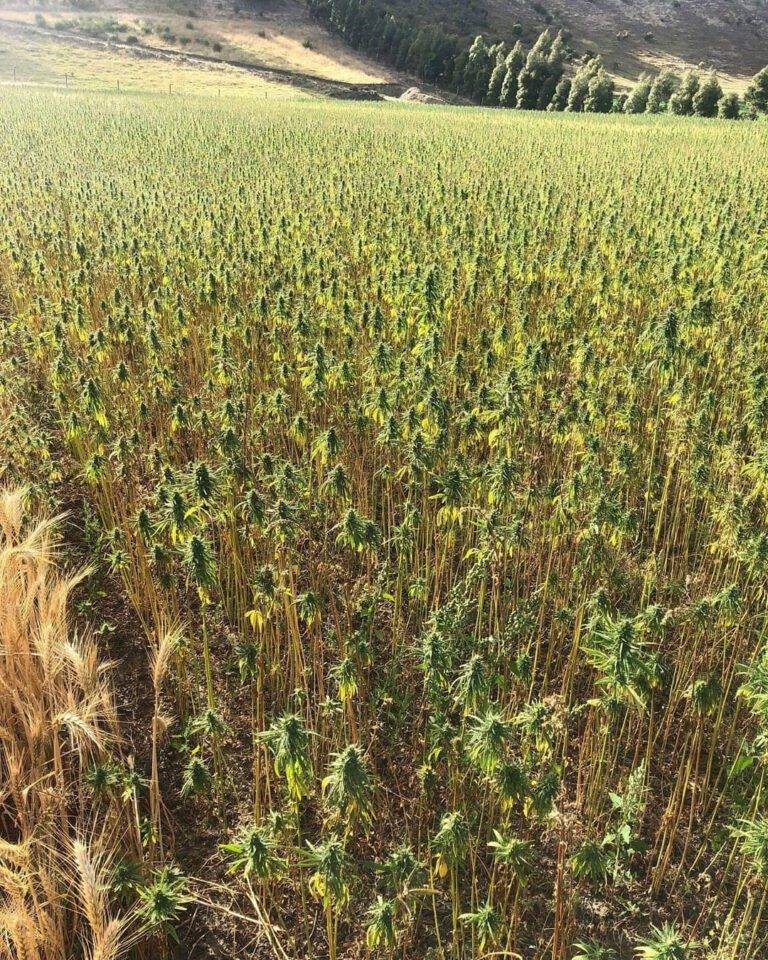Biz Spotlights
Green Business Spotlight: Jungmaven
The Clark County Green Business program was excited to welcome Jungmaven to our network of certified green businesses last quarter. Jungmaven is a clothing company that was founded in the 1990's by activist and designer Robert Jungmann. Their mission is to "build exceptional, sustainable hemp products that drive a cultural shift toward living in balance with the planet." We worked with Sarah Shafer, manager and office administrator at Jungmaven, to bring you this edition of Green Business Spotlight. To learn more about Jungmaven, visit their Green Business listing here.
Can you describe the overall sustainability messaging of your organization?
Sarah: "At Jungmaven, we're here to make more than clothes, we're here to make a statement. Our mission is to build exceptional, sustainable hemp products that drive a cultural shift toward living in balance with the planet.
Fashion isn't just self-expression—it's activism. What we wear speaks volumes about who we are and what we stand for. In a world of fast fashion and disposable trends, we choose to stand firm in our values.
By creating timeless, high-quality hemp garments, we give people the tools to push back. To demand better systems. To back their beliefs with their dollars. This is how we fight for the future, one tee at a time."
What strides have you made in the past year to achieve your sustainability goals?
Sarah: "We've expanded our Upcycled collection to include new pieces made from off-cut materials, what others might call waste, we see as new potential. Every garment in this line is a stand against excess and a step toward smarter, healthier production.
We also launched EverJung, our own resale marketplace where customers can buy and sell pre-loved Jungmaven gear. It's more than secondhand—it's a circular economy in action. A way to keep hemp garments in motion, reduce waste and make sustainable style more accessible for everyone.
We've introduced a new Heathered Collection, made using Cationic Cotton, our most eco-friendly dye process yet. This cotton is treated with chitosan, a natural fiber made from discarded shells of shrimp, crabs, and lobsters, materials that would otherwise go to waste. The result? Unique mélange color effects using all-natural fibers, dyed at lower temperatures with less time, less energy, and no added chemicals.
And coming soon: our partnership with Trashie, a take-back and textile recycling program designed to help our community responsibly recycle or repurpose old clothes. It's a win for the planet and for anyone looking to shop more sustainably while clearing space with purpose."
What measures do you take to minimize waste generation within your business?
Sarah: "We're committed to nearshoring, producing almost everything within a 20-mile radius of Los Angeles. Keeping our supply chain close to home cuts down on shipping, reduces emissions, and keeps us connected to the people who make our clothes.
And unlike most online clothing brands, we don't use polybags for individual items. It takes more training, more time, and more hands-on care from our team but it's worth it. Because creating less plastic waste isn't just a nice idea, it's a responsibility we take seriously.
Turning waste into something useful creates impact that goes far beyond the balance sheet. By eliminating excess, ditching polybags, and reducing packaging waste, we've strengthened our team's connection to our mission and deepened trust with our customers. It's opened the door to new opportunities and pushed us to build a more circular, intentional business.
Every decision we make to reduce plastic, upcycle offcuts, or keep production close to home isn't just about efficiency. It's about shaping the kind of company we believe should exist. It may not always cut costs but it creates lasting value: for our brand, our community, and the planet we all share."
How do you engage employees in sustainable initiatives? What steps have you taken to promote a culture of sustainability among your staff?
Sarah: "Many of our employees were drawn to Jungmaven because of our clear stance on sustainability and environmental responsibility. That shared mindset runs deep across our diverse team and fuels the work we do every day.
We value perspectives shaped by different backgrounds and experiences; it's what drives innovation. Our culture encourages everyone to stay curious, think critically, and speak up with ideas that could help reduce our carbon footprint. We bring these ideas to the table, talk them through as a team, and find practical ways to integrate them into our daily operations. It's how we keep growing, together."
Please tell us any other ways your company supports our community.
Sarah: "We go through a fair amount of cardboard, and whenever materials are no longer usable in-house, we offer them to the community—free. It's been amazing to see folks repurpose these castoffs for moving and storage, shredded packing material, theater sets, and even gardening beds. Turning waste into something useful for others is a small, meaningful way we stay connected to our community and reduce what ends up in the landfill.
We also donate excess product to local organizations doing great work, including:
The Lemonade Project
The Giving Closet
Boards4Buddies
Poco Farm
ReTails
And when disaster strikes, we show up, sending care packages to support victims of Hurricane Helene, the Maui wildfires, California wildfires, and other devastating events.
Our love for nature and the Pacific Northwest runs deep. Through custom-designed tees, we've helped raise funds and awareness for incredible organizations, including:
Columbia Riverkeeper
Mojave Desert Land Trust
New Mexico Beaver Project
Sierra Club
Each partnership supports vital environmental protection efforts and reflects our commitment to building a future that honors the planet and the people who care for it."
What are your company's future sustainability goals for 2025 and beyond? How do you plan to hold your company accountable for achieving them?
Sarah: "The passing of California's SB-707, which holds textile producers accountable for reducing waste, is opening the door to real progress in our industry. It's a meaningful step toward lowering our collective environmental impact and we see it as an opportunity. One of our bigger long-term goals is to participate in fiber-to-fiber textile recycling. With this technology, we could extend the lifespan of our hemp garments by turning them into new ones, keeping valuable fibers in circulation and out of landfills.
At Jungmaven, our commitment goes beyond design and production. We've always been vocal advocates for industrial hemp, pushing for policies and partnerships that support regenerative agriculture and circular systems. Our vision is bold: to see millions of square miles of hemp cultivated worldwide and to help build a thriving, resilient hemp industry right here in the U.S.
Today, over 95% of our products are made in the United States. While U.S. grown hemp fiber is still limited, we're deeply involved in efforts to change that—supporting growers, processors, and innovators working to rebuild this supply chain from the ground up.
This year, we took a big step forward: we began knitting our own fabric in Los Angeles. It brings us closer to a future where we can say not just "Made in the USA," but "Grown and Sewn in the USA."
We hold ourselves accountable by staying transparent, staying close to our supply chain, and staying in constant conversation both internally and with our community.
We set clear, measurable goals, whether it's increasing the percentage of U.S.-made components, reducing packaging waste, or advancing our circularity initiatives and we track progress through regular reviews and team check-ins. We also keep a close eye on what's happening in policy and regulation, like SB 707, and actively adjust our strategies to stay ahead of what's coming.
Just as important, we build accountability into our culture. Every team member is encouraged to speak up, share ideas, and help spot areas where we can do better. We don't claim perfection but we are fully committed to learning, evolving, and doing the work.
Because for us, sustainability isn't a trend. It's a long game and we're in it for real impact."
Do you encourage composting for your employees and/or customers? If so, how?
Sarah: "We do encourage composting for both our customers and employees as part of our commitment to closing the loop and reducing waste.
Hemp is a natural fiber, and our garments are designed to return to the earth over time. We let customers know that our hemp products tend to create more lint in the dryer during the first couple washes. That lint is made up of natural fiber shed, and we suggest adding it to their compost as a brown material—a small but meaningful way to keep textiles out of landfills.
As our garments are worn and loved over time, much of the cotton fiber naturally wears away. What's left is a higher concentration of hemp, which is a longer, durable fiber that can be repurposed—many customers use old tees as towels or rags. When a piece reaches the very end of its life, we encourage people to cut off the care label and compost it or even plant it in the garden, where it can break down and feed the soil."
How has your organization embraced reuse?
Sarah: "Reuse is built into our operations, from how we ship to how we furnish our space.
We redesigned our production box sizes to match the dimensions of our shelving units, allowing us to reuse them seamlessly across storage and shipping. This simple shift eliminated redundancy and led to significant cost savings, not to mention a lot less waste.
We've also embraced reuse in how we equip our workspace. Our break area is furnished with secondhand furniture, and we regularly resell items we no longer need online, giving them a second life instead of sending them to the landfill.
For us, reuse isn't just a sustainability strategy—it's a mindset that helps us make smarter, lower-impact decisions every day."
Share a challenge that your organization had to overcome on your path to sustainability and describe strategies that led you to success.
Sarah: "One of our earliest challenges on the path to sustainability was financial.Specifically, the high cost and minimums associated with ordering fabric in multiple colors. To overcome this, we began purchasing PFD (Prepared-for-dye) fabric and shifted to garment dyeing,a process where finished garments are dyed in small batches. This allowed us to stay nimble, reduce inventory risk, and minimize waste from unsold pre-colored fabric. As an unexpected bonus, the dyeing method gave our products a naturally lived-in, worn-in feel, something our customers loved. Over time, that look became part of our signature aesthetic and brand identity. We also faced the challenge of what to do with products that had minor imperfections—items that weren't perfect, but still totally functional. Instead of discarding them, we created our 5-Pack Sale, which includes these "imperfects." They may have small holes, light blemishes, or stitching quirks, but nothing that affects wearability. This initiative helps keep fully usable garments out of the landfill while offering customers a more affordable, lower-waste shopping option. We don't believe in throwing things away just because they aren't perfect. These strategies taught us to work with limitations creatively and reinforced our belief that sustainability is as much about mindset as it is about materials."
Is there anything else you'd like to share?
Sarah: "Our founder played a key role in the movement that helped legalize industrial hemp in the U.S., a turning point that reopened the door for domestic hemp farming and laid the groundwork for a more sustainable future in textiles. He's been a dedicated advocate for the power of hemp since the early 1990s, well before it entered the mainstream sustainability conversation. At Jungmaven, we've spent decades raising awareness about the many benefits of hemp and why it deserves a central place in the future of fashion. Hemp is regenerative, resilient, and far less taxing on the planet than conventional crops like cotton. It doesn't just use fewer resources—it actively gives back. As we confront the realities of climate change, hemp stands out as one of nature's most powerful tools. One hectare of industrial hemp can absorb over 22-24 tons of CO₂, making it a highly effective form of carbon capture. It's also remarkably water-efficient, requiring about one-fourth the water needed to grow cotton and yielding significantly more fiber per acre. To bring that into perspective: a single hectare of hemp can produce enough fiber to make approximately 7,500 Jung Tees, all while restoring soil health, requiring fewer pesticides, and keeping water use in check. We don't see hemp as just a fiber, we see it as a solution. A path forward. And we're committed to continuing the work: advocating for hemp policy, investing in innovation, and creating garments that prove sustainability can be timeless, durable, and beautiful."




